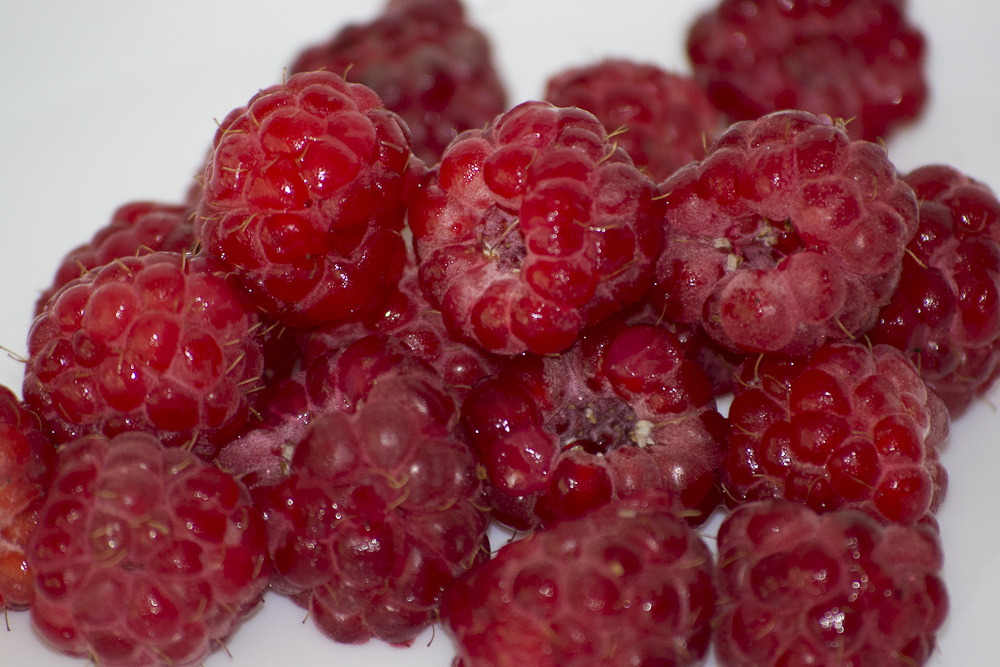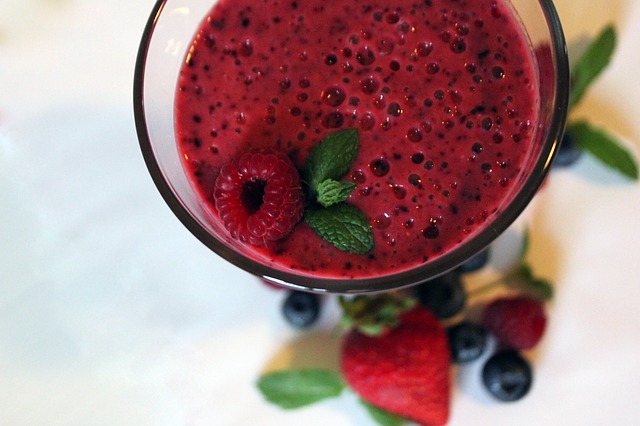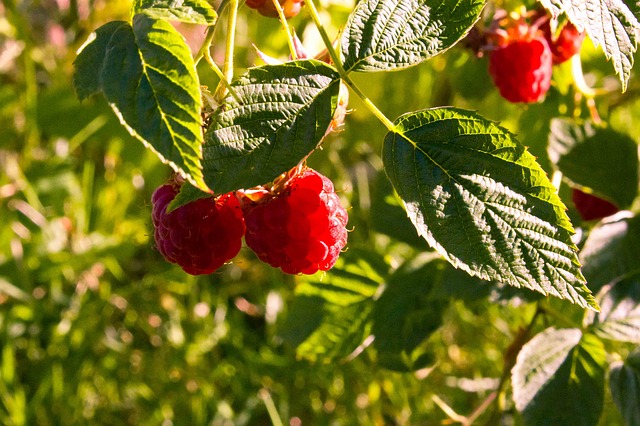Raspberries: Origins - Consumption - Nutrition Facts - Health Benefits
|
|
|
Contents
- Geographic origin and regions grown
- History of consumption
- Common consumption today
- Nutrition Facts: Vitamins, minerals and phytochemical components
- Health Benefits: Medicinal uses based on scientific studies
- Bibliography
Geographic Origins and Regions Grown

Indigenous to Asia Minor and North America, raspberries have been collected as a food source for centuries. The Roman agriculturist Palladius wrote about raspberry cultivation in the 4th century. Ecological findings at Roman forts in Britain included raspberry seeds, which led to the assumption that Romans spread the cultivation of raspberries in Europe.
King Edward I (1272-1307) was the first to call for the cultivation of these berries. Shortly thereafter, British gardens were full of raspberry bushes. By the 18th century, the cultivation of raspberries had spread throughout Europe.
The colonists brought cultivated raspberries to America, and William Price sold the first commercial nursery plants in 1771. By 1867, there were over 40 different varieties of raspberry plants.
After the Civil War, raspberry cultivation spread until there were approximately 2,000 acres in regions of New York, Michigan, Oregon, Washington, Pennsylvania, Ohio, Illinois, and Indiana. By 1949, there were about 60,000 acres of raspberry cultivation.
Today, Washington State produces nearly 70 million pounds of raspberries per year, which is nearly 60% of United State’s raspberry production. California and Oregon are also principal producers. The black raspberry is abundant in the eastern United States, and is only indigenous to North America.
History of Consumption
Raspberries were long considered a luxury, as only the rich were able to enjoy the delicate fruits. By the middle Ages, wild raspberries had many uses. Artists used raspberry juice in both paintings and illumination of manuscripts.
Physicians and herbalists recommended the fruit, leaves, and roots for everything from eye inflammations, boils, and fevers, to bowel problems and even bee stings. Midwives recommended raspberry leaf teas and extracts for treating pregnancy-related problems and to prepare a woman for labor.
During the time when the first European settlers migrated to America, Native Americans were drying raspberries to preserve and easily transport them. By the 1830s, the ripe fruit was made into preserves, jams, jellies, and syrups.
Raspberries were often used to treat cholera and dysentery and the Native Americans were using them for coughs and poultices. Even in the 1900's, raspberry juice was used to make a syrup that disguised the unpleasant taste of other medicines.
Common Consumption Today

Raspberries are a luscious fruit with a short shelf life. Raspberry lovers enjoy them fresh and prepared in every way imaginable, such as in baked goods, salad dressings, as a glaze for meats, and in desserts, beverages, sauces, and preserves. Raspberries are also frozen with or without added sugar.
Nutrition Facts: Vitamins, Minerals and Phytochemical Components
Raspberries are an excellent source of Vitamin C and manganese and are a good source of dietary fiber. They also contain Vitamin A, B1, B2, B3, folate, Vitamin K, magnesium, potassium, copper, calcium, and iron.
Raspberries rank near the top among fruits that are rich in antioxidant strength. These antioxidants are in the form of anthocyanins, ellagic acid, salicylic acid, quercetin, and catechins. Raspberries have an oxygen radical absorbance capacity (ORAC) rating of about 4900 per 100 grams, compared to 9000 ORAC units for wild blueberries, and 2800 ORAC units for apples (2).
Click the link below to see the nutritional value tables for details.

Health Benefits: Medicinal Uses Based on Scientific Studies
Preliminary medical research shows that different raspberry components may be effective in a number of conditions. The antioxidant activity of raspberries is almost 50% higher than strawberries (1), (2). This protection is largely from the ellagitannins, a family of compounds reported to be effective against cancer and almost exclusive to the raspberry.
Raspberries may slow cancer cell proliferation and tumor formation by inhibiting metalloproteinase enzymes, which when too high, play a significant role in cancer development. Saponins contained in raspberries also have remarkable inhibitory effects on the proliferation of cancer cells. Saponins inhibit malignant melanoma cells in laboratory and cell studies and exert antitumor activities by stimulating tumor cell apoptosis (3).
The antioxidant capacity of raspberries also protects the body against cardiovascular disease and has been shown to lower high blood cholesterol. Raspberries are often used as a treatment for diabetes. The unique combination of nutrients, including dietary fiber, helps slow the release of carbohydrates into the bloodstream. Furthermore, raspberries inhibit the production of COX-I and COX-II, in a way similar to Aspirin and Ibuprofen, which makes the fruit helpful in treating inflammatory conditions like arthritis and gout. They are also effective for allergies and age-related cognitive and eyesight decline.
Bibliography
1. Gruenwald J, Brendler T, Jaenicke C, et al. (eds). PDR for Herbal Medicines. Montvale, NJ: Medical Economics, 1998, 688–90.
2. Venskutonis PR, Dvaranauskaite A, Labokas J. (2007) Radical scavenging activity and composition of raspberry (Rubus idaeus) leaves from different locations in Lithuania.
3. Zheng ZX, Zhang LJ, Huang CX, Huang QL, Wei XD, Wu XY, Zhou WM. (2007) Antitumour effect of total saponins of Rubus parvifolius on malignant melanoma Zhongguo Zhong Yao Za Zhi. ,32(19):2055-8.
Disclaimer
Nutritiousfruit.com provides this website as a service. Although the information contained within the website is periodically updated, no guarantee is given that the information provided is correct, complete, and/or up-to-date. The materials contained on this website are provided for general information purposes only and do not constitute legal or other professional advice on any subject matter. Nutrtiousfruit.com does not accept any responsibility for any loss, which may arise from reliance on information contained on this website. The information and references in this website are intended solely for the general information for the reader. The content of this website are not intended to offer personal medical advice, diagnose health problems or to be used for treatment purposes. It is not a substitute for medical care provided by a licensed and qualified health professional. Please consult your health care provider for any advice on medications.
Didn't find what you were looking for? Search here...

Amazon Search Box:
Did you like this page?
|
|
|




